- Home
- W. Somerset Maugham
The Skeptical Romancer Page 24
The Skeptical Romancer Read online
Page 24
A DREAM
AS I WALKED along I thought of a broad road which I see sometimes in a dream, a road winding over the hills just as this one did that I was on; it leads to a city which, I know not why, I am eager to reach. Men and women are hurrying along the road, and often I have awakened to find myself up and half across my room in my desire to be of their number. The city is plain to see, standing on the top of a hill, surrounded by battlemented walls, and the road, broad and white, can be seen winding up to its great gates. The air is fresh and sweet and the sky is blue. They press on, men, women and children, not talking with each other, for they are intent on their purpose, and their faces shine with expectancy. They look neither to the right nor to the left. They hurry and their eyes are eager and bright. I do not know what they await. I only know that they are impelled by some urgent hope. The city reminds one a little of those cities of El Greco which stand on the brow of a rocky hill, cities of the soul, seen tremulously in a flash of lightning that tears across the darkness of the night. But those are cities of narrow, tortuous streets, and the dark clouds encompass them round about. In the city which I see in my sleep the sun shines and the streets are broad and straight. I know vaguely what the men are in those cities of mystics, the manner of them and the peace they offer to the tortured heart; but what kind of men they are in this city of mine and why it is that all those others on the road so passionately seek it, I do not know. I only know that it imports me urgently to go there, and that when at last I slip through its gates, happiness awaits me.
INDIA
INDIA. MAJOR C. He was a tall, broad-built man, with close-cropped brown hair. It was hard to guess his age. He might not have been more than thirty-five and he might have been fifty. He had a clean-shaven face, rather large, but with small features and a short blunt nose. He had an expression of peaceful happiness. He spoke slowly, but fluently, in rather a loud voice. He smiled a great deal and laughed frequently. His manner was cheerful. He was very polite and anxious to do what he could to be pleasant. It was hard to tell if he was intelligent or a little stupid. He was certainly not widely read. There was something of the boy scout about him which was disconcerting; he was childishly pleased when the Yogi came into his room and sat on his chair, and he told me several times that he enjoyed privileges that no other inmate of the Ashrama was accorded. His attitude was a little like that of the schoolboy inclined to boast because he is in the headmaster’s favour.
He has been living at the Ashrama for two years and by special favour has been allowed to build his own little shack with a kitchen behind it. He has his own cook. He does not eat meat or fish or eggs, but has a store of tinned goods from Madras to help out with the curry and curds that his cook prepares for him. He drinks nothing but tea.
In his one room is a pallet bed, a table, an armchair and another chair, a small bookcase in which are perhaps fifty books. They are translations of works on the Vedanta, the Upanishads and so forth, books by the Yogi and books about him. On the walls are a few small pictures, one of Leonardo’s Christ, a few, hideous, of Vishnu, cheap coloured prints and a photograph of the Yogi. The walls are painted green. On the floor a rattan mat.
He wears a sort of Chinese coat and Chinese trousers of white cotton and goes barefoot.
He has an intense adoration for the Yogi and says that he looks upon him as the greatest spiritual figure that the world has known since Christ.
He is somewhat reticent about his past. He said he had no one close to him in England and had travelled a great deal in years gone by, but now, having arrived there, he had reached his goal and would travel no more. He said that he had found peace and (over and over again) that the presence and the sight of the Yogi gave him a spiritual serenity which was beyond all price. I asked him how he spent his day. In reading, he said, taking his exercise (he has a pushbike and cycles regularly eight miles a day), and in meditation. He spent many hours a day sitting in the hall with the Yogi, though often he did not speak more than a few words to him in a week. But he was a strong man in the prime of life, and I asked him whether his natural energy had sufficient outlet. He said that he was fortunate in that he was one of the few persons who had a real desire and liking for meditation; and that he had always practised it. He added that meditation was a strenuous exercise and after spending some hours in it one was physically exhausted and had to lie down and rest. But I could not get from him exactly what he meant by meditation. I could not understand if he was actively thinking of a certain subject. When I put before him the Jesuit contemplation of a particular theme, such as the Passion, he said it was not that at all. He said his effort was to realize the self in him in communion with the universal self, to separate the I that thinks from the self, for that, he said, is the infinite. When he had done that, and really seen, or felt, that the divine in himself was part of the infinite divine he would have reached enlightenment. He was of a mind to stay there till this happened or till the Yogi died.
It was hard to make up one’s mind what sort of a man he was. He was certainly very happy. I had thought to discover something of the truth about him from what he looked like and from what he said, but I came away completely puzzled.
Hyderabad. Passing along the road by car to Hyderabad from Bida I saw a large crowd, the usual Indian crowd, women in bright saris, men in dhoties, ox wagons, cows – I thought it was a small market, but my bearer told me it was the place where a healer lived and all these people were gathered from the surrounding villages to have their ills cured and women, if they were sterile, to be made fertile. I asked if I could go and see him. The driver told me he was a well-to-do contractor in Hyderabad who had felt the call to live the life of a Sadhu and had given over his fortune to his family and settled in that spot. He lived under a peepul tree and tended a small wayside shrine to Siva. We made our way through the crowd. There must have been three or four hundred people. Sick men were lying on the ground. There were women with sick children in their arms. When we got near the shrine the healer came forward and greeted us by humbly doing obeisance to us. He was dressed in a grubby white turban, a shirt without a collar, the ends hanging over his grubby dhoty. He had silver earrings in his ears. He was clean-shaven, but for a short stubble of grey moustache. Small, perky, quick in his movements, gay, bustling and cheerful. He looked not at all like a saint but like any wideawake, active shopkeeper in the bazaar. You would have thought him an obvious fake, but for the fact that he had given up his house and belongings and accepted nothing for his ministrations. He lives on the rice and fruit that people bring him and gives away everything he does not need. He insisted on giving us some coconuts. He heals by saying a prayer to the god in his shrine and by the laying on of hands. I was much embarrassed when as I was leaving he asked me to give him a blessing. I told him I was not the proper person to do that, but he was insistent, and so, feeling hypocritical and very foolish, with all those people looking on, I did what he wanted.
The Sufi. He lived in a little house in a poor quarter of Hyderabad. It was almost a slum. There was a veranda, and we waited there to find out from our guide if the holy man would see us. Taking off our shoes before we entered, we were ushered into a smallish room, divided into two, as far as I could see, by mosquito-netting, and I surmised that the part we could not see was his sleeping apartment. The greater part of the space in which we sat was taken up by a sort of dais or platform, about eighteen inches from the ground, covered with cheap rugs, and on these was a rattan mat on which the saint sat. He was very old, very thin, with a ragged white beard; he wore a fez, a white cotton coat and white trousers; and his feet were bare. His eyes looked very large in the extreme thinness of his face in which the cheek-bones stood out above the sunken cheeks. He had long beautiful hands, but fleshless, and his gestures were profuse, graceful and expressive. Though so old and so frail, he seemed full of energy and talked with animation. He was cheerful. The expression of his face was very sweet and kindly. I do not know that he said anything remarkable
. I know nothing of Sufism and so perhaps was more surprised than I should have been to hear him speak of the self and the supreme self in the same strain as the Hindu teachers speak. The impression I carried away was of a very dear, tender, kindly, charitable and tolerant old man.
A Holy Man. Sir Akbar Hydari sent his car to fetch him and at the appointed hour he entered the room. He was richly dressed and wore a great scarlet cloak of fine material. He was a middle-aged man, tall, of a handsome presence, and his manner was courtly. He spoke no English and Sir Akbar acted as interpreter. He talked fluently and well and his voice was sonorous. He said the things I had heard from others twenty times before. That is the worst of the Indian thinkers, they say the same things in the same words, and though you feel that it should not make you restive, for if they possess the truth, as they are convinced they do, and if the truth is one and indivisible, it is natural enough that they should repeat it like parrots, there is no denying the fact that it is irksome to listen interminably to the same statements. You wish at least they could think of other metaphors, similes, illustrations than those of the Upanishads. Your heart sinks when you hear again the one about the snake and the rope. Custom has too much staled it.
I asked him how I could acquire the power of meditation. He told me to go into a darkened room, sit on the floor cross-legged and fix my eyes on the flame of a candle, emptying my mind of every thought so that it was a complete blank. He said that if I would do that for a quarter of an hour a day I should presently have some extraordinary experiences. “Do it for nine months,” he said, “then come back and I will give you another exercise.”
That evening I did as he had directed. I took the time before I began. I remained in that state for so long that I thought I must have by far exceeded the quarter of an hour he had prescribed. I looked at my watch. Three minutes had passed. It had seemed an eternity.
A week or two ago someone related an incident to me with the suggestion that I should write a story on it, and since then I have been thinking it over. I don’t see what to do. The incident is as follows. Two young fellows were working on a tea plantation in the hills and the mail had to be fetched from a good way off so that they only got it at rather long intervals. One of the young fellows, let us call him A., used to get a lot of letters by every mail, ten or twelve and sometimes more, but the other, B., never got one. He used to watch A. enviously as he took his bundle and started to read, he hankered to have a letter, just one letter, and one day, when they were expecting the mail, he said to A.: “Look here, you always have a packet of letters and I never get any. I’ll give you five pounds if you’ll let me have one of yours.” “Right ho,” said A. and when the mail came in he handed B. his letters and said to him: “Take whichever you like.” B. gave him a five-pound note, looked over the letters, chose one and returned the rest. In the evening, when they were having a whisky and soda after dinner, A. asked casually: “By the way, what was that letter about?” “I’m not going to tell you,” said B. A., somewhat taken aback said: “Well, who was it from?” “That’s my business,” answered B. They had a bit of an argument, but B. stood on his rights and refused to say anything about the letter that he had bought. A. began to fret, and as the weeks went by he did all he could to persuade B. to let him see the letter. B. continued to refuse. At length A., anxious, worried, curious, felt he couldn’t bear it any longer, so he went to B. and said: “Look here, here’s your five pounds, let me have my letter back again.” “Not on your life,” said B. “I bought and paid for it, it’s my letter and I’m not going to give it up.”
That’s all. I suppose if I belonged to the modern school of story writers, I should write it just as it is and leave it. It goes against the grain with me. I want a story to have form, and I don’t see how you can give it that unless you can bring it to a conclusion that leaves no legitimate room for questioning. But even if you could bring yourself to leave the reader up in the air you don’t want to leave yourself up in the air with him.
I went to lunch with the heir apparent and his wife, the Prince and Princess of Berar. During luncheon the prince talked to me of my journey. “I suppose you’ve been to Bombay?” he asked. “Yes,” I answered, “I landed there.” “And were you put up for the Yacht Club?” “Yes,” I said. “And are you going to Calcutta?” “Yes.” “I suppose you’ll be put up at the Bengal Club?” “I hope so,” I replied. “Do you know the difference between them?” the prince asked. “No,” said I innocently. “In the Bengal Club at Calcutta they don’t allow dogs or Indians, but in the Yacht Club at Bombay they don’t mind dogs; it’s only Indians they don’t allow.” I couldn’t for the life of me think of an answer to that then, and I haven’t thought of one since.
BENARES
BENARES. NOTHING CAN be more impressive than to saunter down the Ganges by boat in the evening just before the sun sets. It is thrilling to look at the city with the two minarets of the mosque standing up against the pale sky. A wonderful sense of peace descends upon you. There is a great silence.
Then in the morning before the sun rises you drive through the city, the shops still closed and men under rugs lying asleep on the pavement; a scattering of people are going down to the river, with brass bowls in their hands, for their prescribed bath in the sacred water. You get on to a houseboat, manned by three men, and slowly row down by the ghats. It is chilly in the early morning. The ghats are unevenly peopled. One, I don’t know why, is crowded. It is an extraordinary spectacle, the throng on the steps and at the water’s edge. The bathers take the ritual bath in different ways. For some of the boys it is a lark and they dive into the water, come out and dive in again. For some it is a ceremony that must be gone through as quickly as possible, and you see them make the motions of devotion mechanically and gabble through their prayers. Others take it solemnly. They bow to the rising sun and, their arms outstretched above their heads, utter their prayers with unction. Then, the bath over, some chat with their friends and you guess that the daily obligation offers an opportunity to exchange news and gossip. Others sit cross-legged in meditation. The stillness with which some of them sit is strangely impressive: it is as though in that throng they sat in a temple of solitude. I saw one old man whose face was decorated with great rings of white ash around his eyes, a broad oblong patch on his forehead and square patches on his cheeks, so that he looked as if he were wearing a mask. Many of the bathers, having taken their bath, carefully scrubbed and polished the brass bowl in which they were going to carry back to their houses the lustral water.
It is a moving, a wonderfully thrilling spectacle; the bustle, the noise, the coming and going give a sense of a seething vitality; and those still figures of the men in contemplation by contrast seem more silent, more still, more aloof from human intercourse.
The sun rises higher in the heaven and the grey light which had bathed the scene grows golden, and colour clothes it with a motley radiance.
THE TAJ
TAJ MAHAL. Notwithstanding my expectations and all the pictures I had seen of it, when I got my first and proper view of it, the view from the terrace of the gateway, I was overcome by its beauty. I recognized that this was the authentic thrill of art and tried to examine it in myself while it was still vivid. I can understand that when people say something takes their breath away it is not an idle metaphor. I really did feel shortness of breath. I had a queer, delightful feeling in my heart, as though it were dilated. I felt surprise and joy and, I think, a sense of liberation; but I had just been reading the Samkhya philosophy in which art is regarded as a temporary liberation of the same sort as that absolute liberation in which all Indian religion ends, so it may be that this was no more than a reminiscence that I transferred to my actual feeling.
I cannot enjoy the same ecstasy over a beautiful thing twice over, and next day when I went to the Taj again, at the same hour, it was only with my mind that I enjoyed the same sight. On the other hand I got something else. As the sun was setting I wandered into the Mosque. I w
as quite alone. As I looked from one end along the chambers into which it is divided I had an eerie, mysterious sense of its emptiness and silence. I was a trifle scared. I can only put what I felt into words that make no sense: I seemed to hear the noiseless footfall of the infinite.
MADURA
MADURA. THE TEMPLE at night. There is always a noise in India. People talk all day long at the top of their voices, but in the temple they talk more loudly than ever. The row is terrific. People pray and recite litanies, they call to one another, vociferously discuss, quarrel or greet one another. There is nothing that suggests reverence and yet there is a vehement overwhelming sense of the divine that sends cold shivers down your spine. In some strange way the gods there seem to be near and living.

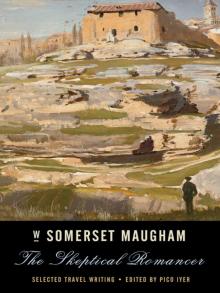 The Skeptical Romancer: Selected Travel Writing
The Skeptical Romancer: Selected Travel Writing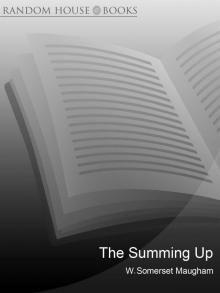 The Summing Up
The Summing Up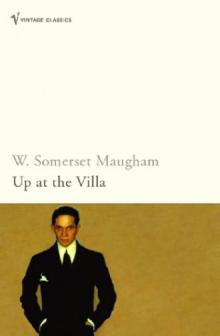 Up at the Villa
Up at the Villa The Razor's Edge
The Razor's Edge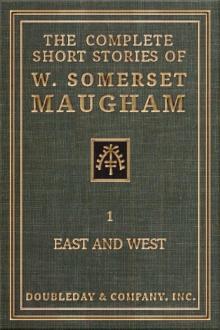 The Complete Short Stories of W. Somerset Maugham: East and West (Vol. 1 of 2))
The Complete Short Stories of W. Somerset Maugham: East and West (Vol. 1 of 2))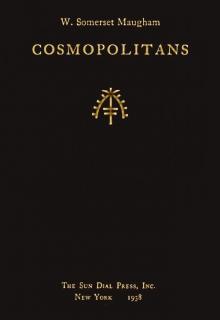 Cosmopolitans
Cosmopolitans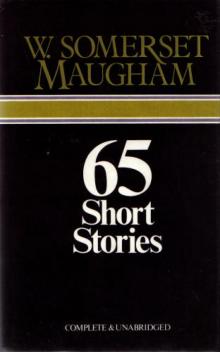 65 Short Stories
65 Short Stories Ah King (Works of W. Somerset Maugham)
Ah King (Works of W. Somerset Maugham) Collected Short Stories: Volume 1
Collected Short Stories: Volume 1 Collected Short Stories Volume 2
Collected Short Stories Volume 2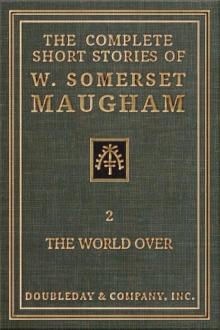 The Complete Short Stories of W. Somerset Maugham - II - The World Over
The Complete Short Stories of W. Somerset Maugham - II - The World Over Collected Short Stories Volume 4
Collected Short Stories Volume 4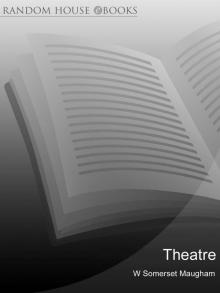 Theatre
Theatre Short Stories
Short Stories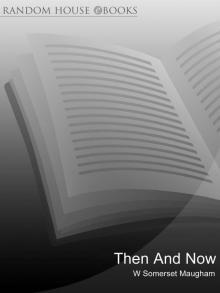 Then and Now
Then and Now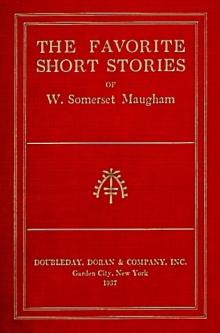 The Favorite Short Stories of W. Somerset Maugham
The Favorite Short Stories of W. Somerset Maugham Of Human Bondage
Of Human Bondage The Magician
The Magician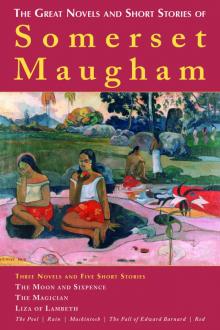 The Great Exotic Novels and Short Stories of Somerset Maugham
The Great Exotic Novels and Short Stories of Somerset Maugham A Writer's Notebook
A Writer's Notebook Christmas Holiday
Christmas Holiday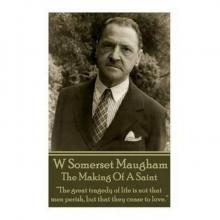 The Making of a Saint
The Making of a Saint Merry Go Round
Merry Go Round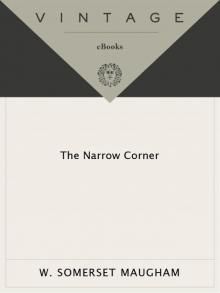 The Narrow Corner
The Narrow Corner Collected Short Stories Volume 3
Collected Short Stories Volume 3 Ten Novels and Their Authors
Ten Novels and Their Authors Ashenden
Ashenden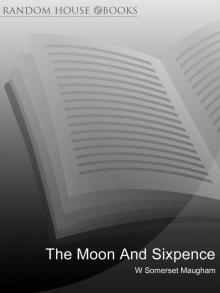 The Moon and Sixpence
The Moon and Sixpence Cakes and Ale
Cakes and Ale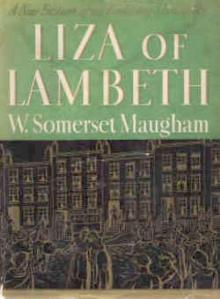 Liza of Lambeth
Liza of Lambeth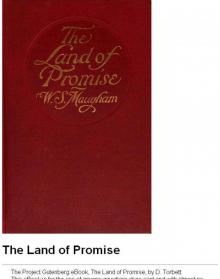 The Land of Promise: A Comedy in Four Acts (1922)
The Land of Promise: A Comedy in Four Acts (1922) A Writer's Notebook (Vintage International)
A Writer's Notebook (Vintage International)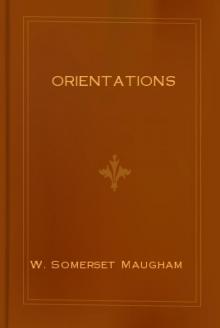 Orientations
Orientations Selected Masterpieces
Selected Masterpieces Mrs Craddock
Mrs Craddock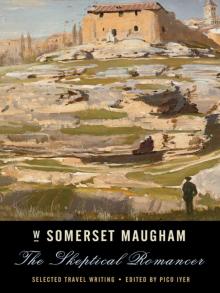 The Skeptical Romancer
The Skeptical Romancer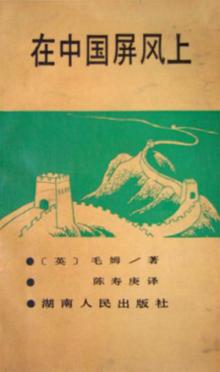 On a Chinese Screen
On a Chinese Screen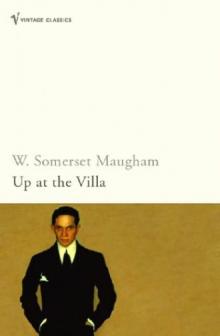 (1941) Up at the Villa
(1941) Up at the Villa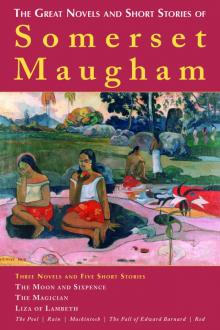 The Great Novels and Short Stories of Somerset Maugham
The Great Novels and Short Stories of Somerset Maugham Ah King
Ah King The Explorer
The Explorer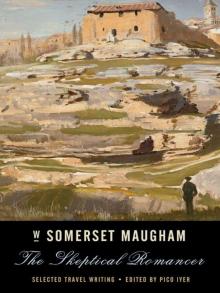 The Skeptical Romancer: Selected Travel Writing (Vintage Departures)
The Skeptical Romancer: Selected Travel Writing (Vintage Departures)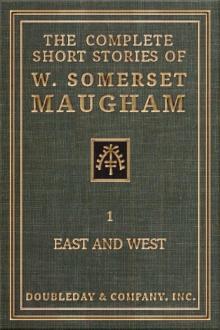 The Complete Short Stories of W. Somerset Maugham - I - East and West
The Complete Short Stories of W. Somerset Maugham - I - East and West